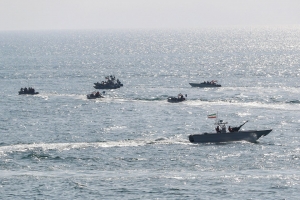mis à jour le Lundi 17 juin 2019 à 17h00

Islamic Revolutionary Guard Corps military units launched war games in December of last year. Iran’s top paramilitary force has found new sources of funding despite U.S. sanctions. PHOTO: TASNIM NEWS AGENCY/REUTERS
www.wsj.com | By Benoit Faucon and Sune Engel Rasmussen | 16, 2019
Infrastructure projects and smuggling help Islamic Revolutionary Guard Corps skirt sanctions
TEHRAN, Iran—The country’s top paramilitary force is maintaining support for armed groups in the Middle East and finding new sources of funding, defying U.S. efforts to curb its activities abroad as tensions between Washington and Tehran soar following fresh attacks in the Gulf of Oman.
Iran’s government has struggled to support an economy under pressure from U.S. sanctions, but its elite defense force has found new sources of revenue, including recently-signed infrastructure contracts in Syria and Iraq as well as expanded smuggling networks, according to advisers to the Guard and the U.S. government.
The clout of the Islamic Revolutionary Guard Corps, a group founded to protect the nation’s security but which has expanded to include construction, banking and smuggling, appears to be growing in Iran as it helps to prop up the economy and keeps more powerful adversaries off balance.
“Everything you see today contributing to the Islamic Republic of Iran’s defense power has been achieved under sanctions,” the group’s commander, Maj. Gen. Hossein Salami, then a brigadier general, said in December, the semiofficial Mehr News Agency reported.
The risk of a bigger conflict has come into sharp relief, as the Trump administration blames the Guard for explosions that crippled Japanese and Norwegian oil tankers on Thursday.
Secretary of State Mike Pompeo over the weekend sought to build international support for Washington’s claim, saying “it’s unmistakable what happened” and that more evidence would be forthcoming.
“The intelligence committee has lots of data, lots of evidence. The world will come to see much of it,” Mr. Pompeo told “Fox News Sunday.”
Tehran has denied involvement in these and previous attacks on tankers in the Persian Gulf last month. Iranian officials have accused the U.S. and its allies in the region of trying to create a false pretext to drag Iran into war.
The U.S. has rolled out an unprecedented array of sanctions, designating the Guard a terrorist organization to prevent foreign companies from doing business with it, and making it illegal for Iran’s oil buyers to import its crude.
In March, the U.S. Treasury banned dealings with the Guard-owned Ansar Bank, saying it was the key vehicle to pay salaries of the group’s Quds Force—which directs Tehran’s Middle East operations—and of its Pakistani and Afghan mercenaries in Syria. In addition, Ansar Bank extended the equivalent of millions of dollars as a loan to a front company controlled by Quds Force, it said.
But corporate records show Ansar Bank’s cash deposits increased by 4% over the past two months as it maintained higher returns on savings accounts. The bank carries extensive disclosures on its financial health as required by Iran’s central bank and the Tehran stock exchange.
The bank declined to comment on U.S. sanctions. In a statement posted on its website, the bank says the “arrogant sanctions…will be no threat” to its activities.
The paramilitary group generates funds from construction works through its engineering arm, Khatam al-Anbia. In Syria, Khatam has in the past year signed contracts for construction and power equipment, a Guard adviser said.
Khatam has built oil and gas pipelines in Iraq between Baghdad and the oil port of Basra, as well as a water-treatment plant in the country.
It also earns funds there from smuggling fuel out of Iran, and taking consumer appliances and cigarettes back into the Islamic Republic, a former Guard official and the adviser to the force said.
The group has gained influence in western Iraq with a powerful Sunni clan and a local Shia group, a person familiar with U.S. intelligence in the region said. In the past two months, the force has assisted the purchases of abandoned houses to benefit the groups, that person said. In return, the groups have allied politically and militarily with the Guard.
The wages of Iraqi militias—some trained by the Quds Force—are funded by the Iraqi government, so they aren’t affected by sanctions on the Guard. The Iraqi embrace of militias hostile to the U.S. is a source of tension between Washington and Baghdad.
On Wednesday, the U.S. Treasury Department blacklisted an Iraqi company it said had trafficked arms valued at hundreds of millions of dollars for Quds Force.
The Guard continue to send bags of cash by plane to the group’s Lebanese proxy Hezbollah in Syria, said Hanin Ghaddar, a visiting fellow at the Washington Institute who studies the group. Hezbollah hasn’t commented.
Iran-allied Houthi rebels in Yemen—which also earn their own revenue through taxes on foodstuffs, fuel and tobacco—have stepped up attacks with drones and missiles on Saudi Arabia’s energy facilities and military airports.
A spokesman for the U.S. Central Command on Saturday said an armed MQ9 Reaper drone was shot down on June 6 by what the military assessed was a Houthi missile. The altitude of the strike indicated that Houthi capabilities were improving, under Iranian assistance, the spokesman said.
On Wednesday , the Houthis claimed a missile attack on an international airport in Abha near the Yemeni border that Saudi-backed military coalition said injured 26 civilians.
Iranian military leaders say its network of allies around the region are offering Tehran a new advantage. When Iran fought Iraq in the 1980s, senior Guard commander Gholam Ali Rashid told parliament last month, the Islamic Republic was on its own.
“Now it has allies all over the region,” he said. “The enemy will pay a heavy price” if Iran is attacked.


